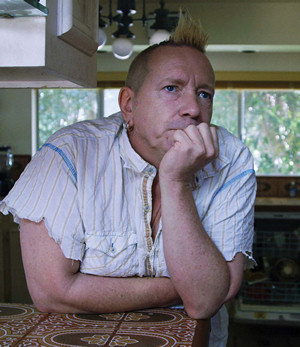
The Public
Image Is Rotten (A Verisimilitude Production. Director: Tabbert Fiiller)
A film about the life of a cultural icon might seem like the perfect
subject matter, if only the icon in question wasn’t so difficult to pin
down, pigeon hole or second guess. John is no ordinary icon, thus
making
this particular subject matter a somewhat daunting task. A complex
figure inevitably draws a myriad of emotions and opinions. Getting this
one honest, open and balanced could only be done from within the Lydon
camp itself providing the project was inclusive of those who passed
through, irrespective of their difference of perspective. This they do,
there is no sugar coating; the highs and lows, the brotherhood and
bust-ups, the triumphs and cock-ups, they are all here.
The film kicks into life with a clip of John in Japan in the early 80’s
telling a journalist that he intends to be around for a long, long
time. So it proved.
John’s childhood is crucial in shaping the man. The church, meningitis,
memory loss, constant illness - both his own and his mother’s - created
obstacles which would have crushed many. Early memories, which at times
bring John close to tears, are shared along with some fabulous family
photographs which add a sense of normality to the struggle.
The Sex Pistols are vital to giving the world John Rotten, but they
form only a small part of the narrative in the overall story, as the
film hits its stride with the birth of PiL. Both original drummer Jim
Walker and Jah Wobble contribute directly to the film and help spell
out the dangerous and often chaotic nature of the band, a theme that
would continue long after they had both departed, whether it be the
Ritz New York riot in ‘81 or the decision to avoid touring in favour of
random shows adding to the band’s financial woes.
Even at this relatively early point in the film, it’s core key strength
becomes apparent; the sheer number of contributors who have gone before
the camera for this project. These range from past band members,
one-off collaborators, personal friends, and musicians influenced by
PiL. It allows for a juxtaposition of opinion and thus adds
considerable weight to the film.
Out of this melting pot come tales both positive (the influence of
Metal Box for one) and not so positive. It’s true to say PiL have been
subject to some unique difficulties, take the stealing of the band’s
tapes by members of the band! Both Jah Wobble and Keith Levene were
guilty, the latter releasing Commercial Zone despite having no
knowledge of some of the tracks he was claiming to be on! Martin
Atkins goes as far as to say he was unaware he was drumming on Wobble’s
own LP, thinking it to be PiL sessions. This sounds a bit far fetched,
nevertheless Martin’s wide ranging input proves welcome as he sheds
light on all manner of PiL happenings during his two stints in the
band, not least the role his Mickey Mouse watch played in the track
Four Enclosed Walls. He’s excellent in fact, recalling his ups and
downs with no bitterness.
This considered approach to the past runs throughout the film. Take
John’s reflections on Keith Levene. Despite the many problems he
caused, John is quick to emphasise that his talent cannot be denied,
nor the music he created. Keith departed from PiL prior to a Japanese
tour due to the band’s fear of him being busted while entering the
country. This followed Japan’s introduction of the ‘Paul McCartney
clause’ after the ex-Beatle was arrested for drugs a couple of years
previously. This left John with no band save Martin on drums. The film
doesn’t duck this period, one when John faced a lot of animosity from
the press. Of course, John was far from finished. The return to form
with Album was a career highlight, and Ginger Baker - despite looking
barely alive - is on hand to recall his contribution.

It was important to hear the thoughts of John’s band members from the
late 80’s. Following the success of Rise, John was back with a ‘proper’
working line-up consisting of some fabulous musicians, two of which, Lu
Edmonds and Bruce Smith, are still in PiL today. Both Lu and bass
player Allan Dias talk about how the rock structure of late 80's PiL
material had constrained John’s performance. It was something Lu made
sure didn’t happen in modern day PiL, believing the songs should never
be played the same twice. He’s right of course, the beauty of PiL is
the freedom of the songs and the performance. Also from this period,
look out for the expression on John’s face in an archive clip when new
PiL guitarist John McGeoch says he’s been ripping off PiL’s guitar
sound
for years so he may as well join them. Priceless.
Along the way, John doesn’t just talk PiL, it’s his life story and we
experience the pain of the loss of his mother alongside the love for
his wife Nora. We also get a hint of John the Dad as the couple
welcomed into their family two of Nora’s grandchildren following the
death of their own mother, and Nora’s daughter, Ari Up of The Slits.
Although as John says, he fiercely projects the privacy of those around
him, after all “I asked for it, they didn’t”.
The
re-invigoration and stability of John over the past decade coupled
with the successful re-launch of PiL has one underpinning and
consistent factor, that of John Rambo Stevens. The on screen captions
which greet Rambo’s appearances in the film change from ‘childhood
friend’ to ‘security’ to ‘manager’. He is all three and has proved
loyal to a fault. As emphasised by Lu Edmonds, this has taken away a
lot of the pressure and uncertainty which John endured under the many
varied managers of days gone by, resulting in a new found freedom for
him. Rambo can also be seen in ‘security’ action during a show,
removing an interloper intent on manhandling John. He’s also not
adverse to protecting the crowd from over zealous bouncers.
With both life and PiL being a more settled affair these days, the tail
end of the film allows space for us to focus on current PiL,
culminating in the track Shoom in which John tells the audience to
‘fuck off’. Bite and wit right to the end.
John has always prided himself on honesty - he talks of this in the
film and the reasons which stem back to his loss of memory as a child.
It’s primarily on this aspect alone that the film needs to stand tall
in order to succeed. On this criteria it hits the spot. However, The
Public Image Is Rotten triumphs not only for its honesty alone. As it
unfolds, the viewer is witness to a detailed, enthralling, balanced,
insightful life story packed with touching humanity and a healthy dose
of humour. Oh, and a fantastic soundtrack.
To both John Lydon the man, and The Public Image Is Rotten the film, we
salute you.
Review by Phil
Singleton
|
God
Save The Sex Pistols ©2018 Phil Singleton / www.sex-pistols.net
All rights reserved. Not to be
reproduced without permission.
|


